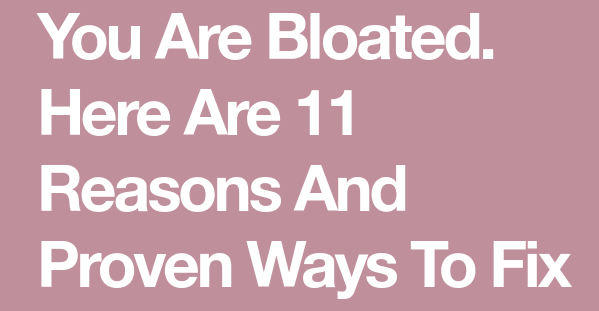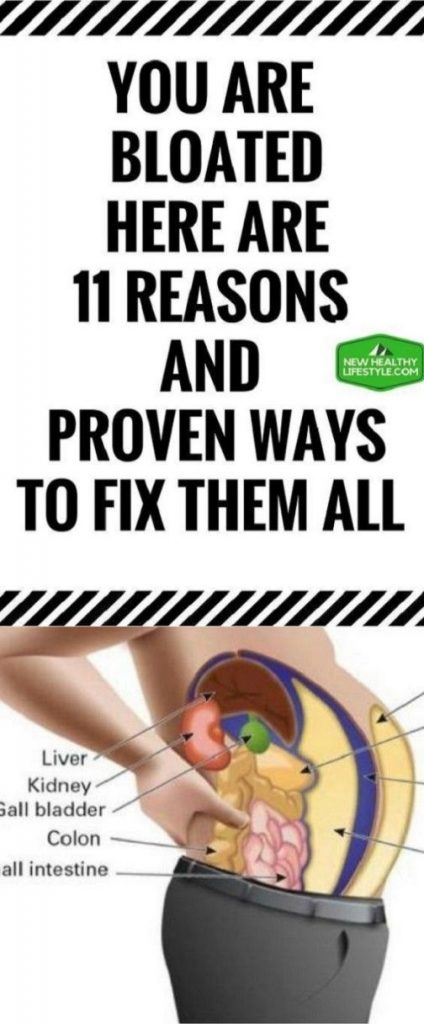
Bloating is so common these days it’s been called an epidemic.
It is an uncomfortable condition that is usually caused by excess gas production.
It can be also caused by some disturbances in the movement of the muscles of the digestive system.
This increases discomfort and pressure, which in turn makes the stomach look bigger.
To simplify, bloating includes excessive amounts of gas, liquids or solids in your digestive system.
In some cases, bloating can be caused by increased sensitivity.
You will feel an increased pressure in your abdomen, even though there is not.
Even though bloating can be caused by serious medical conditions, in most cases, it is caused by the diet and some foods you are intolerant to.

11 Ways to Reduce or Eliminate Bloating
Don’t Eat Too Much At A Time
Being full may feel like being bloated. However, your problem is that you ate too much.
If you are having big meals and afterwards you feel uncomfortable, you should try small portions.
In fact, many people who experience bloating do not have an enlarged stomach or increased pressure in the abdomen.
In most cases, the problem is sensory.
If you are constantly dealing with bloating, you will experience discomfort from a smaller amount of food, compared to the person who rarely experiences bloating.
This means that you have an increased sensitivity to food in the stomach.
This is the main reason why you should have smaller meals.
Chewing your food better can also be of significant help.
It can reduce the amount of air you swallow with the food (a cause of bloating), and it will make you eat slower, which is related to reduced food intake and smaller portions
Rule Out Food Allergies And Intolerances To Common Foods
A great number of people experience food allergies and intolerances.
When you consume foods that you are intolerant to, this can lead to excess gas production, bloating, and other symptoms.
Foods and ingredients that you should avoid:
Lactose: Lactose intolerance is related to many digestive symptoms, such as bloating. Lactose can be found in milk
Fructose: Fructose intolerance can cause bloating.
Eggs: Bloating and gas are main symptoms of egg allergy.
Wheat and Gluten:
Being allergic to wheat, or intolerant to gluten (a protein in spelt, wheat, barley and some other grains) is a common condition. This can cause different digestive complications, including bloating.
Try avoiding some of these foods to find out if they are causing the problem. But if you think that you have a food allergy or intolerance, visit your doctor.
Avoid Swallowing Air and Gases
It has been shown that there are two sources of gas in our digestive system. One gas is air or gas swallowed when we eat or drink while the other one is produced by the bacteria in the gut. Carbonated beverages (soda or fizzy drinks) contain bubbles with carbon dioxide a gas released from the liquid after it reaches the stomach. Increased amounts of swallowed air can be also caused by eating while talking, eating while in a hurry, chewing gum, and drinking through a straw.
Don’t Eat Foods That Give You Gas
Some foods that are high in fiber can make you produce excessive amounts of gas. These foods include beans, lentils, and whole grains. You can keep a food diary to find out which foods make you more gassy and bloated. Fatty foods can slow down digestion and emptying of the stomach.
Reduce your consumption of beans and fatty foods to find out if it helps.
Try A Low FODMAP Diet
The most common digestive disorder is irritable bowel syndrome (IBS). It is believed to affect 14% of people. The main symptoms include abdominal pain, discomfort, bloating, diarrhea, and constipation. Most of the IBS patients have bloating. 60% of them claim that bloating is the worst symptom they experience, even worse than abdominal pain. According to many studies, indigestible carbohydrate known as FODMAPS can significantly exacerbate symptoms in patients with irritable bowel syndrome.
FODMAP stands for Fermentable, Oligo, Di-, Mono-saccharides And Polyols.
It has been shown that a low-FODMAP diet can effectively reduce symptoms such as bloating in IBS patients. A low-FODMAP diet can be good if you have problems with bloating, with or without other digestive symptoms.
Here are some common high-FODMAP foods:
Onions
Wheat
Broccoli
Garlic
Cabbage
Beans
Artichokes
Cauliflower
Apples
Watermelon
Pears
Be Careful With Sugar Alcohols
Sugar-free foods and chewing gums usually contain sugar alcohols. These sweeteners are believed to be safe alternatives to sugar. However, they can lead to digestive problems. They can reach the bacteria in the large intestine, which digest them and produce gas.
Therefore, it is very important to avoid sugar alcohols like sorbitol, mannitol, and xylitol.
Take Digestive Enzyme Supplements
You can use some over-the-counter products that can be of significant help. This includes supplemental enzymes that have the ability to break down indigestible carbohydrates.
Lactase: An enzyme beneficial for individuals with lactose intolerance. It can break down lactose.
Beano: It is packed with the enzyme alpha-galactosidase. This enzyme breaks down indigestible carbohydrates from certain foods.
Typically, these supplements provide immediate relief!
Don’t Be Constipated
Constipation is one of the most common digestive problems. It can have different causes. Many studies suggest that constipation can contribute to bloating. Increasing your intake of soluble fiber can be very beneficial in the case of constipation. However, people who have gas or bloating need to be very cautious since fiber can often make things worse. You can also increase your physical activity, or take magnesium supplements!
Take Probiotics
Another thing that can also cause bloating is the gas produced by the bacteria in the intestine. There can be different types of bacteria that live there and this mostly depends on the individual. According to some clinical trials, certain probiotic supplements can reduce gas production and bloating in individuals with digestive problems. Other studies claim that probiotics can only reduce gas, but not symptoms of bloating. Probiotic supplements offer many other benefits, so don’t hesitate to try them. Be patient since they can take a while to start working through! It is recommended to try kefir. It is a beneficial food that provides sustainable probiotics.
Peppermint Oil Can Help
Altered function of the muscles in the digestive tract can also be a cause of bloating. Antispasmodics are drugs commonly used for reducing muscle spasm. However, peppermint oil is a natural alternative that can provide the same effects. According to many studies, peppermint oil can effectively reduce numerous symptoms in IBS patients, including bloating.
See A Doctor To Rule Out A Chronic And/Or Serious Condition
If this problem continues, causing serious problems in your life, or it gets worse all of a sudden then you should immediately visit your doctor!
Diagnosing digestive problems can be really complicated and there may be a possibility of some chronic and serious medical condition.
However, bloating is usually reduced by making some diet changes!

Leave a Reply